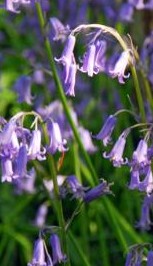 The harebell of Shakespeare has been identified as the wild hyacinth, Hyacinthoides non-scripta (syn. Scilla nutans), called English bluebell in modern times. It is a perennial spring blooming bulb native to woodlands along the Atlantic from southwestern Spain to Britain. The linear, dark green leaves are produced in a clump of 3-6 and are up to eighteen inches long. Five to twelve nodding flowers are carried in one sided racemes on arching stems. Each violet-blue flower is bell-shaped, ½- ¾ inch long, and has a sweet fragrance. Plants prefer dappled shade, and humusy, moist, well-drained soil. They grow in USDA zones 5-7.
The harebell of Shakespeare has been identified as the wild hyacinth, Hyacinthoides non-scripta (syn. Scilla nutans), called English bluebell in modern times. It is a perennial spring blooming bulb native to woodlands along the Atlantic from southwestern Spain to Britain. The linear, dark green leaves are produced in a clump of 3-6 and are up to eighteen inches long. Five to twelve nodding flowers are carried in one sided racemes on arching stems. Each violet-blue flower is bell-shaped, ½- ¾ inch long, and has a sweet fragrance. Plants prefer dappled shade, and humusy, moist, well-drained soil. They grow in USDA zones 5-7.
In Cymbeline (act iv, sc 2, 220) Arviragus, the youngest son of King Cymbeline morns the death of his new friend ( actually his sister in disguise) who is not dead but drugged.
I’ll sweeten thy sad grave: thou shalt not lack
The flower that’s like thy face, pale primrose, nor
The azured harebell,like thy veins, no nor
The leaf of eglantine